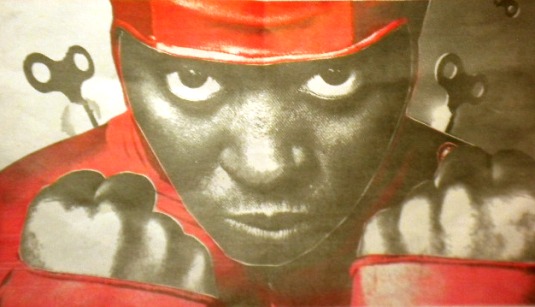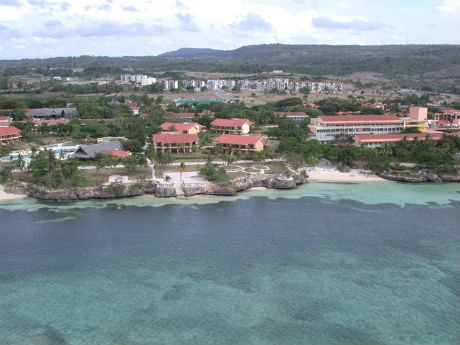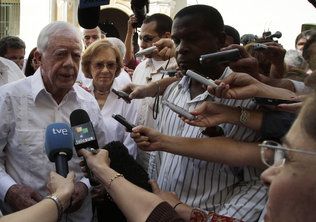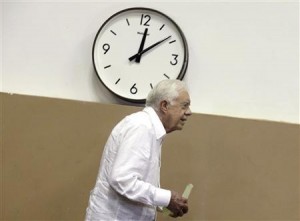Some suggest that, in Cuba, the sustained and increasing harassment of dissidents and independent civil society groups responds to a government offensive strategy designed to eliminate pockets of resistance to the dictatorship, marked at times by a preponderance of alternative civic sectors and the use of information technologies and communications. For my part, I don’t share this view. Far from being an “offensive”, I think this is a desperate defensive strategy to try to stop the unstoppable.
After watching the four television broadcasts of the pitiful series “Cuba’s Reasons” aired so far, there should not be any doubt that the blogging activity developed in recent years is hitting the regime’s ideological structure. The “cyber-war”, the central theme of the latest chapter in this series (Monday, March 21, 2011, 8:30 pm) was specifically about bloggers, in an unsuccessful attempt to make us subject to American Federal resources which, according to them, reached us through awards won by Yoani Sánchez and, as the result of the tricky official math, amounts to the fabulous amount of half a million dollars. As usual, this time they failed to present any evidence, so they were forced to offer their supreme action: deceit.
On this occasion, the clumsy manipulation began with a macabre introduction: the US government (who else!) is developing a frightening new war: the cyber-war, for which it has trained its agents in Cuba (that’s us, of course), called on to destabilize the revolution and the country, to subvert and destroy the people’s gains, which subliminally suggests the fragility of a “deeply rooted people’s process”, jeopardized by a scant group of “cyber-warriors” in a country with an almost nil level of Internet access.
To reinforce the lie, the written press tiresomely repeats it, asserting that the external enemies “are trying to promote the so-called ‘independent bloggers
“in order to demonize the country before international public opinion, so that they may offer an image of cyberspace as the genuine and only world, from which to speak and act” (Granma, March 22, 2011, p. 4). The truth is that the government has already has made great strides towards that mission of soiling itself before international opinion by keeping the repudiation brigades active against defenseless civilians; imprisoning journalists and others for expressing and defending differing ideas; allowing a political prisoner to die in a hunger strike; killing completely defenseless psychiatric patients through malnutrition, cold, lack of care and several other niceties. I don’t think that blogging activity could surpass that record.
Incidentally, the press omitted one small detail: the blogosphere uses the net because it is the only channel available to citizens since the government has a monopoly on the press; in contrast, we do not have a monopoly on the Internet. This detail is what allows the government to unleash a major campaign against independent bloggers based on a sack of lies absolutely counter to the spirit that has prevailed in the blogosphere –- which defends peaceful changes and civic principles before ideological ones — designed for the ongoing deception of the people. “Bloggers have appealed to uprisings in Cuba during interviews, they encourage violence, support the Cuban Adjustment Act, justify the blockade, deny that the most reactionary exile sector in Miami is an enemy of the Cuban people, state that Luis Posada Carriles’s case is a smokescreen, and even openly express the change of the political system … ” (Ibid, pg. 5)
Particularly poignant in the TV series is the revisiting of the bogus reference to Luis Posada Carriles as one of the alternative blogosphere links in a vulgar attempt to touch a sensitive nerve in people still moved by the memory of the dead from the heinous Barbados crime, an event that the aforementioned character has been systematically accused of by the Cuban authorities. Only a very sick government may so unscrupulously manipulate the sensitivity of the people. Seventy-three people, mostly young Cubans, were killed on that fateful day, and the regime has made use of this tragedy for nearly 35 years. They should show more respect for the memory of those killed and their relatives.
However, despite everything, we should be grateful to the Castro media for the free propaganda. It is very possible that, even with low ratings of the series, some sufficiently apprehensive Cubans –- some of those that we seem to have too many of — who, until now, were unaware of the blogger phenomenon, might begin to explore on their own and arrive at us and at the reality of what we are. Maybe the new breed of cyber-warriors will be composed of some of those young students to whom the anti-cyber TV chapters are directed. For the time being, it is noteworthy that this is the first time they have not presented a new infiltrated agent, which may be due to the transparent character of the alternative blogosphere, where we express publicly what we think in private. We have repeatedly publicly expressed a clear interest for whatever agents they want to assign to us to participate in our courses and meetings, without having to go through the cumbersome process of their infiltration, but they have never responded.
Definitely, the alternative blogosphere has conquered, alone, a place on the Internet. The system is surprised at the freedom call of a handful of Cubans that has managed to remain on the net based on will and modesty, and has enjoyed the understanding and support of thousands of its exiled countrymen, as well as of many other citizens of the free world. Authorities fear, logically, the spread of this terrible virus, the feeling of civic freedom. And since this is our own achievement, beyond governments, assumed financing, and interests outside the pure exercise of freedom of expression that moves us and which we practice without asking anyone’s permission, I am speaking on my own behalf and not as a representative of my colleagues, because independent bloggers have the additional quality of not being affiliated with a common platform or the guidelines of any institution.
This cannot be said about the official “blogger” block — created and controlled by the government to angrily reply with the same old slogans — which stays comfortably protected, without any risk, under the shadow of the longest dictatorship in the Americas. Alternative bloggers are not slaves to any power, and we represent only ourselves as individuals. Paradoxically, that, far from weakening us, makes us morally strong before the colossal repressive government machinery that plagues us.
And, though some readers believe that it’s futile to try to disprove so many lies born of the insecurity of a regime that is past its glory days, I want to challenge the government, from this small venue for a people’s forum, to show its intended strength and its conviction of people’s faith in the revolution by publishing at least part of our posts, or to broadcast the blogger-video “Citizens’ Reasons” in its media. Although, of course, it is clear they will not have enough courage to do so.
Or, on second thought, perhaps it would be enough for the people of this country to have full access to the Internet so they can see for themselves the “lies” that we the “cyber-warriors of the Empire” publish. That way, they would have an opportunity to fight us with true knowledge of cause, without intermediaries. For my part, I would gladly assume the consequences of such a risk.
Translated by Norma Whiting
23 March 2011







 Salty or sweet. Dark or medium roasted. Havana wouldn’t be the same without the peanut sellers. Eating peanuts is a major way to spend more than an hour waiting at one of Havana’s crowded bus stops.
Salty or sweet. Dark or medium roasted. Havana wouldn’t be the same without the peanut sellers. Eating peanuts is a major way to spend more than an hour waiting at one of Havana’s crowded bus stops. In real politics what the media reports is important. But even more crucial still is what is not said. Jimmy Carter’s three days in Havana seems to suggest that Barack Obama’s administration asked the ex-president of the United States serve as a mediator with the riffraff for the Jewish contractor Alan Gross, sentenced to 15 years in prison for trying to set up computer systems and parallel communications not authorized by the Cuban regime.
In real politics what the media reports is important. But even more crucial still is what is not said. Jimmy Carter’s three days in Havana seems to suggest that Barack Obama’s administration asked the ex-president of the United States serve as a mediator with the riffraff for the Jewish contractor Alan Gross, sentenced to 15 years in prison for trying to set up computer systems and parallel communications not authorized by the Cuban regime.